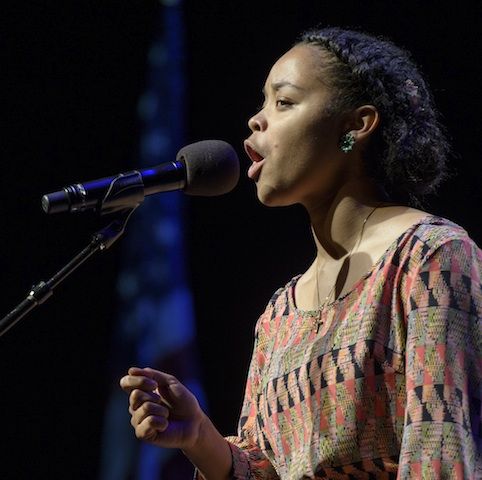At the end of most T&W programs, we hold a celebration that launches an anthology of student work and features performances of poems by a selection of student readers. While not every student will perform their work onstage, it’s important to me as an educator that every student feels a part of the rehearsal process. This lesson uses video and audio recordings of the same poem to help students understand how a spoken delivery can shape an audience’s experience of a poem. As students compare the different readings, they also practice a vocabulary that they can then use to give feedback to each other as they prepare their own poems for performance.
Warm-up:
Ask students: What advice would you give to someone presenting their poem for an audience?
You might have students write down their ideas before sharing them out loud to encourage a wider range of responses. When students share, I like to write as many ideas as possible on the board so that we have them for reference for the remainder of the lesson.
Mentor Text:
Pass out copies of Robert Hayden’s “Frederick Douglass.” Before reading, you might want to take the opportunity to make connections to social studies curriculum, asking students what they know about Frederick Douglass, or offering a bit of historical context.
Explain to students that you’re going to listen to three different people read this poem, and compare their performances.
Play the first performance, by Branden Emanual Wellington: https://www.youtube.com/watch?v=nTmU2nI4X-I&t=133s
Ask students: What did this reader do well? What could he improve on?
Guide students to be specific in their responses, and to give detailed praise and critiques.
Play the second performance, by Shawntay A. Henry: https://www.youtube.com/watch?v=rG9877CqppA&t=35s
Again, ask students what this reader did well, and what she could improve on. Which of the two readings do students prefer, and why? Help students to be as specific as possible in their responses.
Play the third recording (audio only), of Robert Hayden himself: https://www.youtube.com/watch?v=XeD9XYeIRoI
Ask students to respond to Hayden’s reading, comparing it to the previous two, and noting what he did well and what he could improve. Note that the poet isn’t necessarily the definitive authority on how their poem should be performed!
Practice:
Now that students have practiced formulating detailed, constructive feedback on three different performances, give them an opportunity to apply this to their own performance skills. You might work in groups, or have one reader at a time practice in front of the whole class. Students can offer feedback orally, in written form, or in some combination of the two.
If students are preparing their own writing for performance, let them practice reading theirs. For a lower-stakes option, you might ask students to practice performing “Frederick Douglass” or another published poem.
Regardless of how you structure the practice time, be sure that students are still offering both praise (what did this reader do well?) and constructive criticism (what could the reader improve on?).
Extension:
If you like, you might also have students record each other’s readings (video or audio) so that students can critique their own performances from an audience perspective
Download: Preparing to Perform: Practicing Peer Feedback
Photo (top) via GCS Instructure

